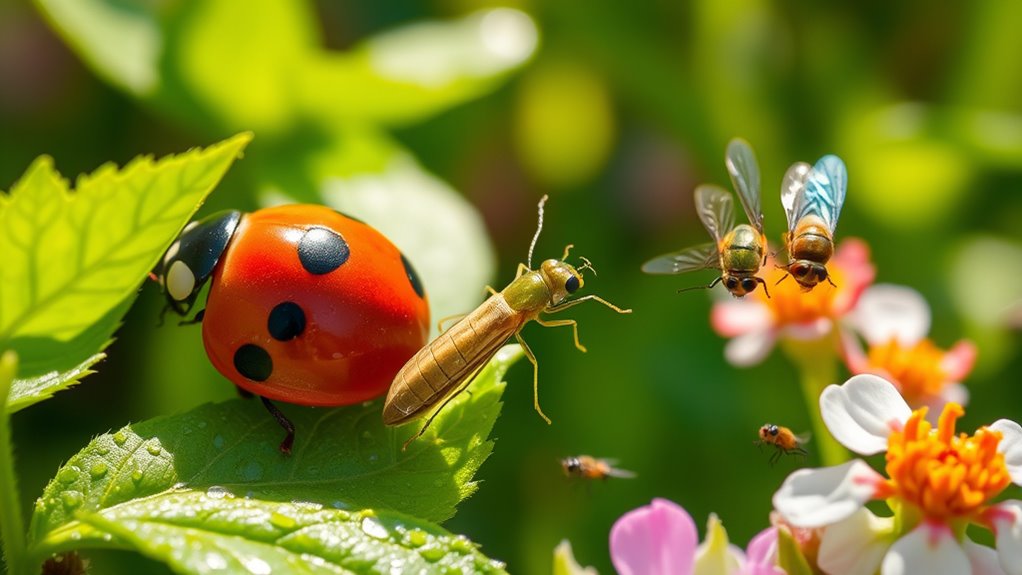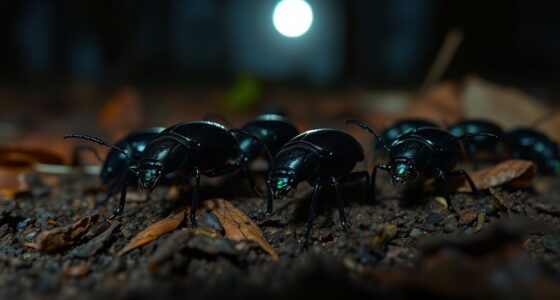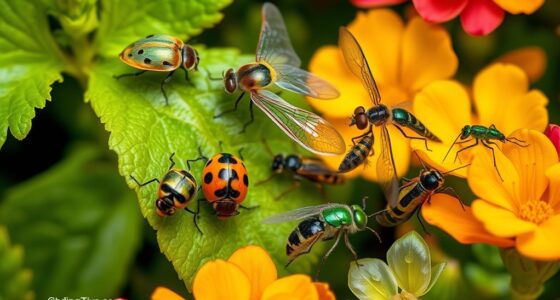To keep your garden healthy, it’s essential to know about seven beneficial insects: ladybugs, lacewings, predatory beetles, pollinating bees, butterflies, hoverflies, and parasitic wasps. These helpful bugs naturally control pests like aphids and caterpillars while boosting pollination. Creating a diverse habitat attracts them and promotes a balanced ecosystem. By encouraging these insects, you’ll support healthier plants and larger harvests. Want to discover how to attract these helpful allies to your garden? Keep going for more tips.
Key Takeaways
- Ladybugs effectively control aphids, scale insects, and other soft-bodied pests naturally.
- Lacewings prey on aphids, whiteflies, and caterpillars, aiding in pest reduction.
- Hoverflies, especially their larvae, feed on aphids and help suppress pest populations.
- Parasitic wasps target and parasitize pest insects like caterpillars and whiteflies.
- Predatory beetles hunt and consume soil-dwelling pests, supporting overall garden health.

Beneficial insects play a vital role in maintaining a healthy garden by naturally controlling pests and promoting plant growth. When you incorporate these helpful bugs into your gardening routine, you reduce the need for chemical pesticides and foster a more sustainable environment. One of the most effective ways they support your garden is through pest control strategies. Instead of spraying chemicals to eliminate pests, you can encourage beneficial insects like ladybugs, lacewings, and predatory beetles to do the work for you. These insects hunt and feed on common garden pests such as aphids, whiteflies, and caterpillars, keeping populations in check naturally. By creating a welcoming habitat—like planting diverse flowers and avoiding pesticides that harm beneficial bugs—you ensure these natural pest controllers thrive. This approach not only keeps pest numbers manageable but also minimizes damage to your plants, resulting in healthier, more resilient growth.
In addition to pest control, beneficial insects considerably enhance pollination, which is essential for fruit and flower production. Bees, including native species and honeybees, are exceptional pollinators. When you provide flowering plants that bloom throughout the growing season, you attract these pollinators, increasing pollination efficiency. Enhanced pollination leads to better fruit set and larger yields, making your garden more productive. You can also encourage other pollinating insects like butterflies and certain beetles, which visit flowers for nectar and inadvertently transfer pollen. By fostering a diverse insect population, you’re not only protecting your plants from pests but also ensuring they receive the pollination boost they need to flourish. This dual benefit helps you achieve abundant harvests and vibrant blooms.
To maximize these benefits, you should adopt pest control strategies that prioritize the health of beneficial insects. Avoid using broad-spectrum insecticides, which often wipe out both harmful and helpful bugs. Instead, opt for targeted, organic solutions or introduce specific beneficial insects to your garden through purchased or naturally occurring populations. Providing habitats such as insect hotels or planting nectar-rich flowers encourages beneficial insects to settle and reproduce nearby. Remember, a balanced garden ecosystem relies on these natural allies working in harmony. Additionally, understanding the role of insect diversity helps you create a more resilient garden environment where beneficial insects can thrive alongside your plants. By understanding their roles and creating an environment that supports their presence, you’ll cultivate a thriving garden that sustains itself. With patience and proper planning, your garden becomes a self-regulating system where pests are kept in check, and pollination is maximized, resulting in healthier plants and more bountiful harvests.
Frequently Asked Questions
How Do I Attract Beneficial Insects Naturally to My Garden?
To attract beneficial insects naturally, you should focus on creating a welcoming environment. Practice companion planting and increase garden diversity by adding flowering plants that provide nectar and pollen. Avoid pesticides, and leave some areas undisturbed for shelter. These steps encourage beneficial insects to settle in your garden, helping control pests naturally. With a diverse, vibrant garden, beneficial insects will thrive and support your plants’ health effortlessly.
Are There Any Harmful Insects Mistaken for Beneficial Ones?
You might mistake some harmful insects for beneficial ones, so pest identification is key. Pay attention to insect behavior: beneficial insects often have specific roles like pollination or pest control, whereas harmful ones tend to damage plants or carry diseases. Learn to observe their movements and habits closely. This way, you can protect your garden from pests while encouraging the beneficial insects that naturally support healthy growth.
Can Beneficial Insects Control All Types of Garden Pests?
You might wonder if beneficial insects can control all garden pests, but pest specificity varies among species. While many beneficial insects, like ladybugs and lacewings, target specific pests, they don’t handle every problem. Insect diversity in your garden helps guarantee a natural balance, but for serious infestations, combining beneficial insects with other integrated pest management strategies is often necessary. This approach maximizes pest control effectively.
How Do I Safely Introduce Beneficial Insects Into My Garden?
Introducing beneficial insects into your garden is like releasing tiny superheroes! To do it safely, start with companion planting to attract helpful bugs naturally. You can also set up insect hotels nearby, providing safe harbors for beneficial insects to thrive. Avoid pesticides, and release insects during early morning or evening when they’re most active. This gentle approach guarantees your garden stays balanced and vibrant, filled with nature’s own pest controllers.
Do Beneficial Insects Require Specific Environmental Conditions?
Beneficial insects do need specific environmental conditions to thrive. You should consider factors like seasonal activity, as some insects are active only during certain times of the year. Additionally, avoid using pesticides that can impact these helpful bugs, reducing their effectiveness. Providing a diverse, pesticide-free environment with proper soil and plant choices encourages beneficial insects to establish and maintain a healthy balance in your garden naturally.
Conclusion
By attracting these beneficial insects, you can naturally protect your garden and reduce chemical use. Did you know that ladybugs can eat up to 5,000 aphids in their lifetime? Incorporating these insects into your gardening routine not only promotes healthier plants but also supports local ecosystems. So, next time you see a curious bug, consider its helpful role—your garden will thank you for it! Embrace nature’s pest controllers and enjoy thriving, vibrant plants.









